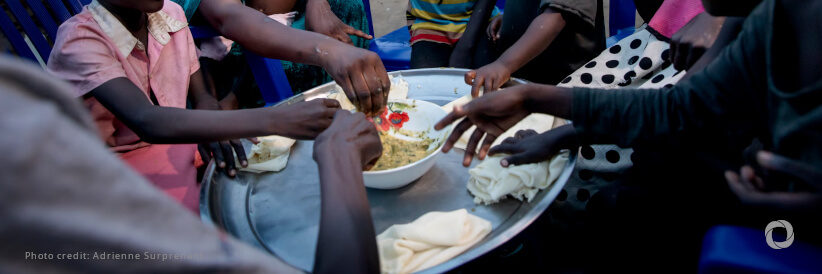Countries must act now to break the deadly links between conflict, climate, and food insecurity, UN Secretary-General António Guterres said, addressing a Security Council meeting focused on these challenges.
“Climate chaos and food crises are serious and mounting threats to global peace and security. It is only right that they are addressed by this Council,” he said.
Representatives from nearly 90 countries are participating in the debate, convened by Guyana, which holds the rotating Council presidency.
Hunger in Gaza
Climate disasters and conflict both inflame inequalities, imperil livelihoods, and force people from their homes, Mr. Guterres told ambassadors. They are also two of the leading drivers of the global food crisis, with almost 174 million worldwide affected in 2022.
The UN chief was dismayed that the world is teeming with examples of the devastating relationships between hunger and conflict.
One such situation is Gaza, where “no one has enough to eat,” he said. “Of the 700,000 hungriest people in the world, four in five inhabit that tiny strip of land.”
Furthermore, climate disasters add another dimension to the suffering in many places. All 14 countries that are most at risk from climate change are experiencing conflict, with 13 also facing humanitarian crises.
Food inflation returns
Affected nations include Haiti, where hurricanes combine with gang violence and lawlessness, putting millions at risk.
In Ethiopia, nearly 16 million people are estimated to require food assistance in the wake of a war followed by drought – a situation that is exacerbated by the influx of refugees fleeing the conflict in neighboring Sudan.
“Meanwhile, globally, we risk a resurgence of food inflation as droughts sap the Panama Canal and violence hits the Red Sea – throwing supply chains into disarray,” he added.
SDGs are the answer
With the climate crisis set to deepen as emissions continue to rise and hunger increases each year, the Secretary-General called for action, urging all warring parties to abide by international humanitarian law.
At the same time, humanitarian operations must be fully funded “to prevent disaster and conflict from feeding hunger”, he continued, noting that last year, they were less than 40 percent funded.
“We must create the conditions to resolve conflict and preserve peace – within countries and between countries,” he said. “Turbocharging progress towards the Sustainable Development Goals (SDGs) – including our goal of zero hunger – is the answer.”
Mr. Guterres further called for “massive investment” to create healthy, equitable, and sustainable food systems that “feed the planet without wrecking the planet”.
‘Get a grip’ on climate
Other steps include building and financing social protection systems as well as strengthening and renewing global peace and security frameworks.
Countries “must get a grip on the climate crisis to limit the rise in global temperature to 1.5 degrees Celsius,” he added, reiterating his call for richer nations to lead the way in phasing out fossil fuel use.
The international community also needs to “get serious” about climate adaptation, including ensuring that all people everywhere are protected by early warning systems by 2027.
Greater investment in the SDGs also needs to occur, and Mr. Guterres recalled his proposal for a $500 billion annual SDG stimulus plan to boost sustainable development and climate action.
Climate updates and plans
The head of the UN’s climate change secretariat, UNFCCC, suggested that the Security Council should be requesting regular updates on climate security risks. Simon Stiell added that every country must implement a national climate action plan to protect people, livelihoods, and the natural environment.
“Investing in climate resilience and adaptation, including changing agricultural practices towards regenerative food production while working to nurture and conserve nature, would not only blunt the damage from extreme climate events, but can also ensure that future food security needs are ensured sustainably and universally, leaving no one behind,” he said.
Countries also need money for adaptation, particularly developing nations that are vulnerable to climate shocks. However, they currently require $2.4 trillion annually to build clean energy economies and adapt to climate impacts, and funding gaps remain.
Small farmers have big risks
Beth Bechdol, Deputy Director-General of the UN Food and Agriculture Organization (FAO), also briefed the Council.
She reported that 258 million people in 58 countries are facing high levels of acute food insecurity, with over two-thirds due to climate and conflict. While the climate crisis spares no one, “it does not affect everyone equally or in the same way,” she told ambassadors.
“We know that the populations at greatest risk are those that depend on agriculture and natural resources. They live in rural areas, and they are farmers themselves.”

